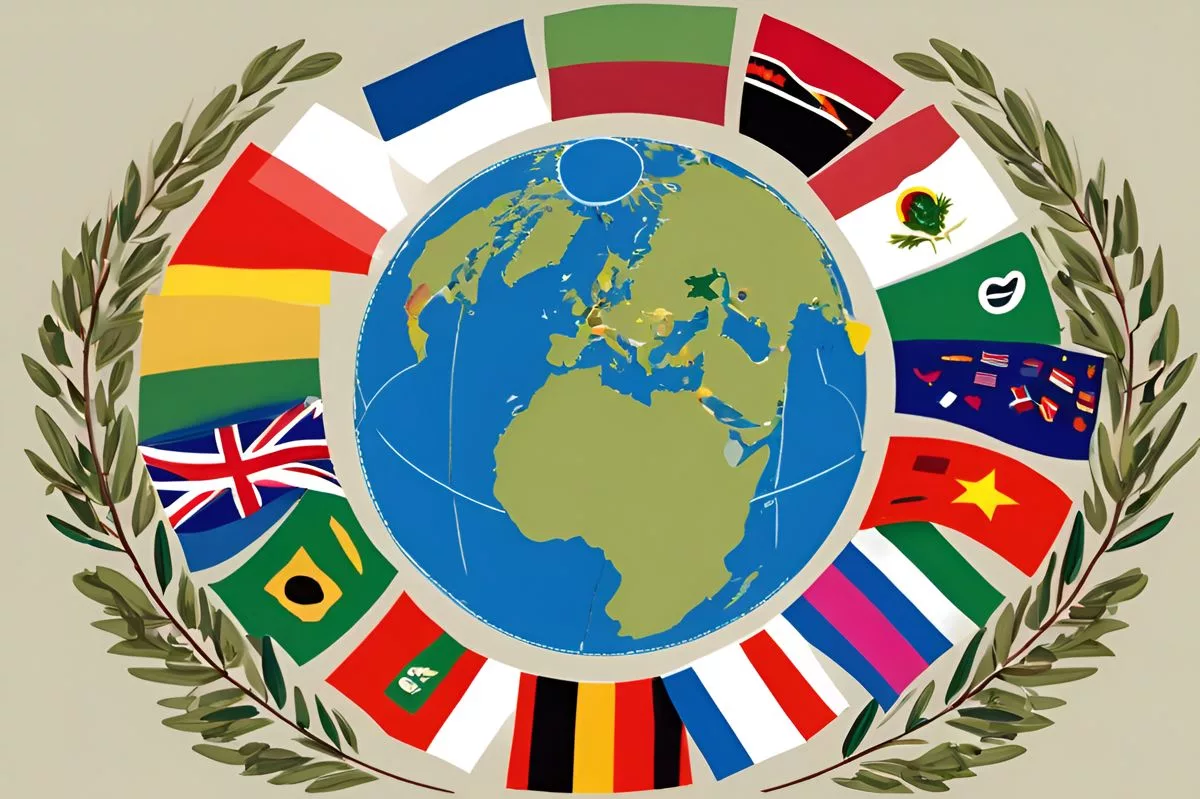South Africa and the United States are looking forward to a bright future in business together. South Africa wants to attract $100 billion in investments over the next five years, focusing on exciting areas like green energy. President Cyril Ramaphosa shared this vision at a big meeting in New York, highlighting how important partnerships are for both nations. With strong support for clean energy and a commitment to growth, South Africa is ready to shine on the global stage, inviting US businesses to join in this journey of shared success and prosperity.
What are the future prospects for US-South Africa bilateral business relations?
The future of US-South Africa bilateral business relations looks promising, driven by strategic partnerships, ambitious investment goals, and a focus on sectors like green energy. South Africa aims to attract USD 100 billion in investments over five years, enhancing economic growth and regional collaboration.
Strengthening Economic Ties
In today’s age of rapid globalization and interconnected markets, strategic international partnerships have become paramount. Recent events underscore this reality, particularly President Cyril Ramaphosa’s address at the South Africa/USA Business Forum held at the New York Stock Exchange. This significant gathering marked a pivotal moment for bolstering economic relations between the United States and South Africa.
President Ramaphosa opened his address by expressing gratitude to the New York Stock Exchange leadership for their hospitality. His visit to the United States, the first since the general elections in May, took place under a Government of National Unity (GNU). This unified government, representing ten political parties, is dedicated to a national agenda that focuses on inclusive growth, job creation, and poverty reduction. The President underscored the urgency of establishing an ethical and developmental state.
South Africa has set forth ambitious economic initiatives, aiming to attract R2 trillion, or roughly USD 100 billion, in investments over the next five years. This goal follows the successful early completion of a previous target of R1.2 trillion, with investments across various sectors including mining, manufacturing, agriculture, automotive, and the digital economy. The energy sector, particularly renewable energy, has seen a significant influx of investments, aligning with South Africa’s commitment to reducing carbon emissions in line with global climate change agreements.
Diverse Investment Landscape
President Ramaphosa highlighted the extensive structural reforms implemented since 2018, which have created a more attractive investment environment. This forward momentum is particularly evident in the clean energy sector, which has drawn considerable interest from investors. The President emphasized the importance of a Just Energy Transition, ensuring that no community is left behind while addressing inclusivity and developmental needs.
South Africa’s industrial policy aligns with this vision by expanding special economic zones, promoting export-led growth, and capitalizing on the Africa Continental Free Trade Area (AfCFTA). The preferential trading under AfCFTA, which began in January 2024, further cements South Africa’s role as a regional economic powerhouse. The Government of National Unity remains committed to prudent monetary and fiscal policies and to strengthening regulatory frameworks to combat corruption.
A key theme in the President’s address was South Africa’s progress in enhancing anti-money laundering measures. Recognized by the Financial Action Task Force (FATF), South Africa’s status was upgraded in November 2023, reflecting the nation’s dedication to creating a stable and secure environment for investors.
Vision for Future Growth
Drawing inspiration from historical and artistic movements, President Ramaphosa likened South Africa’s current transformation to the Renaissance, a period marked by economic prosperity and cultural revival. South Africa’s structural reforms have positioned the country as an attractive destination for foreign investors. The US State Department’s 2024 Investor Climate Statement lauded South Africa’s advanced and diverse economy, well-regulated capital markets, stable institutions, and mature financial sector.
Looking ahead, President Ramaphosa envisions South Africa playing a pivotal role in the development of future value chains. With significant reserves of critical minerals essential for the energy transition, South Africa aims to lead in the green energy sector. The country holds the world’s largest reserves of platinum group metals, giving it a competitive edge in producing sustainable energy technologies such as electric vehicles and renewable energy components. Additionally, South Africa has established a regulatory framework to exploit the potential of the hydrogen economy.
President Ramaphosa appealed to US businesses to collaborate with South Africa in its green energy initiatives. The Just Energy Transition Investment Plan outlines the financial requirements to meet decarbonization goals and presents numerous investment opportunities. South Africa’s Infrastructure Fund, with a ten-year allocation of USD 6.5 billion, aims to attract financing from private investors and multilateral development banks. The fund’s project pipeline includes water, sanitation, energy, transport, digital infrastructure, agriculture, agro-processing, and housing.
Collaborative Progress and Partnerships
The President’s address shed light on the ongoing partnership between the government and businesses, which has been instrumental in tackling national challenges. Initially formed to address an energy crisis, this collaboration has now expanded to include transportation, logistics, crime, and corruption. A senior South African business leader aptly described the GNU as heralding a new era of partnership and renewed investor confidence.
President Ramaphosa also expressed appreciation to the New York Stock Exchange for its role in deepening bilateral relations. The Memorandum of Understanding between the NYSE and the Johannesburg Stock Exchange, signed in 2022, marked a significant milestone. This agreement focuses on developing new financial products, sharing knowledge about Environmental, Social, and Governance (ESG) criteria, and exploring opportunities in Exchange Traded Funds (ETFs) and digital assets. The NYSE’s considerable market capitalization and active trading underscore its critical role in global finance, while the JSE, Africa’s largest stock exchange, offers substantial market depth and liquidity.
The strategic alliance between the NYSE and JSE exemplifies the mutual benefits of cross-border investment. South African companies gain access to the extensive capital and investor base of the NYSE, while US firms can tap into African markets. This collaboration enhances market positions, promotes cross-border investments, and drives global economic growth.
A Future of Shared Prosperity
The United States remains one of South Africa’s most valued trading, investment, and development partners. This partnership aligns with South Africa’s national priorities and extends to education, culture, tourism, and institution-building. Many US companies, including Procter and Gamble, Ford Motor Company, GE Healthcare, Amazon, John Deere, General Motors, and Walmart, operate in South Africa.
In 2023, the United States ranked as the second-largest destination for South African exports, with bilateral trade totaling USD 17.6 billion. US imports made up 8 percent of South African exports, while the African Growth and Opportunity Act (AGOA) and Generalized System of Preferences (GSP) facilitated 25 percent of the country’s global exports. AGOA, in particular, has significantly boosted South African exports in sectors such as automotive, wines, citrus, iron, steel, organic chemicals, and precious stones, contributing to job creation.
South Africa’s position as an anchor for regional value chains further strengthens its economic importance. By sourcing inputs from neighboring countries and re-exporting finished products to global markets, including the US under AGOA, South Africa fosters regional economic integration and growth.
President Ramaphosa’s address highlighted the increased investor confidence in South Africa’s economy. He extended an invitation to US investors to participate in South Africa’s path to recovery, emphasizing the stability and security of investments in the country. The President’s message underscored Africa’s compelling growth narrative, with projections indicating significant population and economic expansion by 2050.
President Ramaphosa’s speech at the South Africa/USA Business Forum was a powerful narrative of hope, progress, and collaboration. It depicted a nation on the brink of transformative growth, inviting US businesses to join this journey towards shared prosperity. The event emphasized the critical role of international partnerships in fostering economic development and achieving sustainable growth. South Africa stands poised to embrace a future of inclusive progress, leveraging its strengths and partnerships for the benefit of its people and the global community.
FAQ: South Africa and the US Bilateral Business Relations
What are the primary goals of South Africa’s investment strategy over the next five years?
South Africa aims to attract $100 billion in investments over the next five years, focusing on sectors such as green energy, mining, manufacturing, agriculture, automotive, and the digital economy to promote economic growth and regional collaboration.
How is South Africa improving its investment environment?
Since 2018, South Africa has implemented extensive structural reforms that have created a more attractive investment climate. President Ramaphosa emphasized the country’s commitment to a Just Energy Transition, which ensures inclusivity in economic development and addresses both growth and community needs.
What opportunities are available for US businesses in South Africa?
US businesses have significant opportunities to engage in South Africa’s green energy initiatives and various sectors supported by the Just Energy Transition Investment Plan. The country’s Infrastructure Fund also seeks to attract private investments in essential areas like water, energy, transport, and housing.
How does the partnership between the NYSE and JSE benefit both US and South African companies?
The strategic alliance between the New York Stock Exchange (NYSE) and Johannesburg Stock Exchange (JSE) enhances mutual benefits in cross-border investment. It allows South African companies to access the NYSE’s extensive capital and investor base, while US firms can leverage African markets, bolstering market positions and driving economic growth.
How does the African Growth and Opportunity Act (AGOA) impact South Africa’s economy?
AGOA significantly boosts South African exports by facilitating trade and providing preferential access to the US market. In 2023, the United States was the second-largest destination for South African exports, totaling $17.6 billion, with AGOA contributing to about 25% of the country’s global exports across various sectors.
What is the long-term vision for South Africa’s economic growth?
President Ramaphosa envisions South Africa as a leader in green energy and critical minerals for sustainable technologies. By enhancing its regulatory framework and fostering international partnerships, South Africa aims to play a pivotal role in global value chains and position itself as an attractive investment destination, ultimately promoting shared prosperity and inclusive growth.












